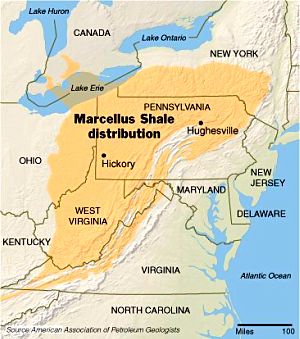Gas exploration has been happening in Pennsylvania since the 1800s. However, a new technology and new price incentives have made possible the exploration of the Marcellus shale. It is a geological formation – the size of Greece – stretching from New York to West Virginia and holding what could become the nation’s most prolific natural gas reservoir. In 2008, Penn State University estimated the economic value of the formation at $1 trillion and that, for every $1 billion in royalties paid to Pennsylvania residents, nearly 8,000 jobs would be created.
The pace of exploration accelerated in 2008 due to increased demand and higher gas prices. Companies rushed to add acreage, expand leaseholds and submit applications to drill the Marcellus shale. In mid-2008, in northeastern Pennsylvania, gas operators were offering landowners as much as $3,000 per acre and 15 percent royalty over the period of the lease. A landowner with a well on his property could expect to make $800,000 in royalties during the first year of production. Thousands of property owners in Pennsylvania signed leases welcoming the extra income in a region that has long suffered from economic malaise.
As Blueprint America correspondent Rick Karr uncovered, not everyone in northeastern Pennsylvania is thrilled about this new gas rush. The main areas of concern relate to the impact of exploration and drilling on the environment and on local infrastructure.
Environmentalists point to the vast amounts of water (one to five million gallons per well) required to extract gas from the Marcellus shale and to the potential contamination of groundwater and watersheds. Drilling is done horizontally and uses hydrofracking – high-pressured water laced with chemicals is pumped into the earth to break the rock and extract gas trapped 7,000 feet below ground. Frac water is then diluted before being released into waterways. Environmental groups are seeking increased oversight and regulation from state agencies.
At the local level, the gas bonanza can put serious stress on a town’s infrastructure. Increased truck traffic accelerates the wear and tear of country roads and bridges. Children of rig workers must be accommodated in local schools. Pennsylvania does not tax gas revenues. Local jurisdictions with natural gas wells face higher demands for services, but receive little new revenues to pay for those services. School districts, county and municipal governments who own land leased for natural gas are looking for ways to receive windfalls from leasing and royalties. At the state level, Governor Rendell lifted a 2003 moratorium on drilling to shore up the state’s ailing finances. Bidding for oil and gas drilling rights on state forest land atop the Marcellus shale was initiated in September 2008. The lease revenues will go to the Oil and Gas Lease Fund which finances park, conservation, recreation, dam repair and flood-control projects.



